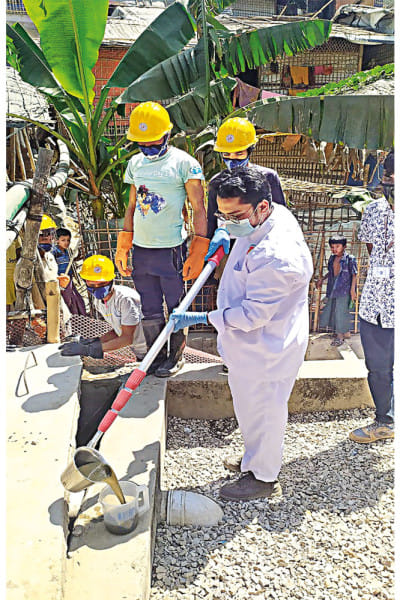All-season, wide-ranging Bangla-Swiss stories

Rain or shine, Switzerland has fostered a comprehensive friendship and partnership with Bangladesh over the last five decades. Take the example of the recent flash floods that affected the lives of millions of people in the northeastern regions: Switzerland was one of the first development partners that promptly announced emergency support (BDT 1.92 crore) to join public and private actors in alleviating the plight of the flood victims in the greater Sylhet division and Netrakona district. This swift and urgent support was used to provide food and other essentials to the affected population through UNDP Bangladesh's Human Rights Programme and in collaboration with the National Human Rights Commission Bangladesh. Solidarity, effectiveness and agility have been touchstones of Switzerland's actions in different fields in Bangladesh.
One unique feature of Switzerland's response to the Rohingya refugee crisis is our direct presence on the ground in Cox's Bazar. Coordinated through a Swiss team stationed in the coastal town, Switzerland, among other interventions, has worked with the Department of Public Health Engineering (DPHE) to equip and open a fecal sludge laboratory in the city. Being the first of its kind in Bangladesh, this laboratory allows DPHE to test treated wastewater and fecal sludge from treatment plants in Cox's Bazar district and therefore protect the environment and public health. Technical know-how transfer is another remarkable hallmark of this Swiss support. The laboratory staff have indeed received both online and in-person training and have by now started collecting samples from the refugee camps for lab analysis.
Impact investment is an innovative and transformational way to generate positive social and environmental outcomes and tackle the distinctive challenges of our time. Switzerland supports impact investing initiatives globally, especially in emerging economies. To help the country's thriving start-up scene tap its potential, Switzerland is implementing the B-Briddhi programme. This initiative aims to address the market challenges and support high-potential impact enterprises in securing funding and scaling their operations. Drawing on Switzerland's penchant for technology and innovation, B-Briddhi builds a strong pipeline of highly-impactful and investable enterprises for the start-up ecosystem.
The private sector plays a quintessential role for the implementation of the SDGs. In this respect, Switzerland also plays a facilitator's role in bringing public and private actors, including the Swiss private sector, together to address jointly critical present-day challenges, for example in the domain of waste management.
The bilateral investment and trade ties between Switzerland and Bangladesh have been thriving! Swiss companies have a substantial investment footprint in this country and are active in crucial sectors, including pharmaceuticals, chemicals, agro-food industry, construction, transportation and many more. They offer and provide innovative, high-quality and environmentally friendly products, technologies and services to the local market and, thus contribute to job creation and sustainable economic development. According to Bangladesh Bank, the Swiss companies' Foreign Direct Investment in the last five years amounted to around $200 million. Last year, the bilateral trade volume crossed the symbolic mark of $1 billion.

 For all latest news, follow The Daily Star's Google News channel.
For all latest news, follow The Daily Star's Google News channel. 



Comments